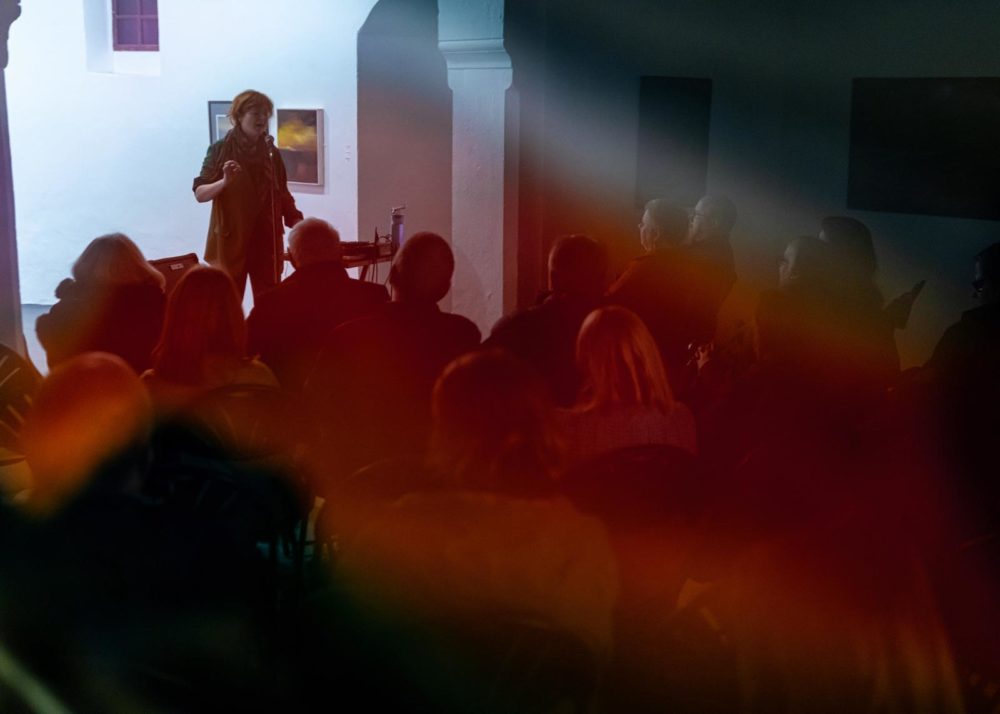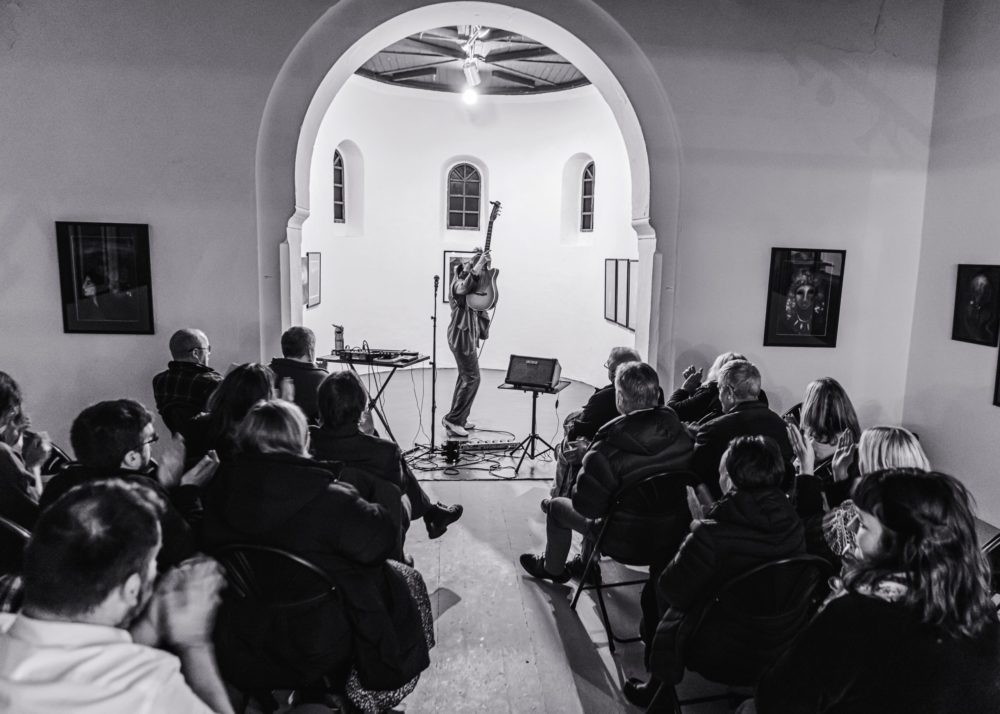Must-watch documentary on Wales’ lost music comes to S4C

Stephen Price
A documentary highlighting Lleuwen’s groundbreaking chapel tour which followed years of extensive research into Wales’ lost music comes to S4C this Friday.
Curadur will be shown on S4C on Friday 20 December at 21.30, and to highlight the episode, hints have been released on Lwp’s Instagram page featuring snippets from the tour with narration from Lleuwen.
The episode will see Lleuwen choose some of her favourite artists, including Georgia Ruth, who will visit some of the chapels involved in the tour and share intimate performances.
View this post on Instagram
Lleuwen Steffan is a singer, songwriter and musician from Rhiwlas in Gwynedd. Now living in Brittany, she returned to Wales this year for an intimate chapel tour of Welsh folk hymnal music, bringing to life her latest project – Tafod Arian.
Lleuwen composes music for theatre and film, mainly in Welsh and Breton, and we chatted with her earlier this year before the tour and appearances at the Eisteddfod and Lorient Interceltique Festival to delve into her influences and her love of Welsh folk hymnal music.
Lleuwen discusses the importance of keeping this beautiful historic, and vitally important Welsh cultural treasure trove alive and enjoyed today – giving a hint towards this Friday’s must-see S4C documentary.
Celtic connections
Lleuwen is the winner of a prestigious Welsh Folk Award for original song Bendigeidfran as well as France 3 Priziou award for best album for “Tan”.
She is a mother, speaker of Welsh, Breton, French and English, and besides writing and performing her own music, and unearthing and reviving music from the past, she also studies Theology.
Critics have described her as possessing “a voice of archetypal Welsh beauty—simultaneously heavenly and earthy – a true soul whammy.”
“Watching Lleuwen perform is a unique experience. Originally from Wales but living in Brittany, her songs are written in the Celtic languages of her homelands – Welsh and Breton.”
“This may be a sound you’ve never heard. It’s Celtic music . . . but not as you know it.”
What attracts you to folk hymnal music?
“Welsh hymns resonate with me in ways that other music does not. They always have. They connect me. They have been present in all my albums in some shape or form so it’s not surprising that I was so attracted to these unofficial, traditional hymns when I came across them in 2012.
“At that time I was involved in project called 10 Mewn Bws / 10 In a Bus that was organised by Trac Cymru. This project took 10 musicians of different genres around Wales to learn about Welsh traditional music. One of the things we did was go to the sound archive at St Fagans’s Museum to listen to Welsh folk tunes.
“But it wasn’t the recordings of folk tunes that caught my attention but it was these recordings of hymns that I had not seen in the hymn books. After further research I learned that some of these hymns were not in the old editions of the hymn books either. No one knows who wrote them but we know they were loved enough to be passed on from generation to generation.”
Archives
“This was the beginning of my search for Welsh traditional folk hymns. I would go to St Fagans archive at every opportunity after that. I got to know the staff and they have been so helpful and thankful to me for doing this. If I had a gig in south Wales I’d arrange a visit to the archive too.
“Life, motherhood and work meant that I could only do this when I had bits of free time here and there but when Covid hit and lockdown happened, I got my home and head organised, gathered the research, composed the music and tried to make sense of it all.
“Musically, I’m not interested in recreating something from the past. That’s missing the point. Yes, the words are old but the message is always new. The music is free form.
“I have been composing for film and theatre for the past four years, and this has been wonderful. It has really inspired me to work beyond the borderlines of song. The voices from the archive bring out the message. And I’m here for the ride, singing along and accompanying these voices with guitar or synth.”

Ancestry
“I have met the descendants of most of these people who’s voices are used within the music. The families have been so welcoming and have unintentionally steered the music to other unexpected directions. I was introduced to (and became rather obsessed with) recordings of the “Hwyl Gymreig” which are the half sung half spoken sermons of Wales that were popular during the nineteenth century.
“These sermons are unlike anything I have ever heard before. Mindblowing. I have also been introduced to recorded memories of the 1904/05 revival. If these memories were documented in written form, one could only read the words. But with audio, the emotional recall within voices is captured. ”
Did you grow up attending church or chapel?
“There is no shop, pub or cafe in the village of Rhiwlas in Eryri where I grew up, so Sunday School was a major social gathering for me as a kid. I chose to go.”

“My parents were not chapel goers and I never felt any pressure to believe or not to believe. I went to Sunday School because I loved it. I continued to go long after my friends dropped out and as a teens I’d drink with my mates in Bangor on the Saturday night then get the last bus back home and roll out of bed the following day to go to Sunday School.
“That’s a strange paradox but, you see, something kept bringing me back. That something has always been there. For that I am extremely thankful and am listening to it more and more.”
Tell us more about this tour
“I am taking this music to the Eisteddfod Festival and Lorient Interceltique Festival with a wonderful band of Breton and Welsh musicians.Watch this space!
“But before putting these hymns on stage, I wanted to take them back to the chapels where they were born. I feel strange about charging people to go to chapel to hear lyrics that belong to them.
“And thanks to the Presbyterian Church of Wales, the Union of Welsh Independents and the Baptist of North East Wales there will be free entry for all.
“I will be there as a soloist with various intruments and pedals. It will be a shared experience hopefully, I don’t think there should be a fourth wall. Some chapels have to provide tickets because there of limited spacing but it’s still free entry for all.
“It will be my pleasure provide explanations and translations to audience members who do not understand Welsh. This work belongs to all of us and I’m here to share.”
View this post on Instagram
Listen to Lleuwen on Spotify and follow her work on Instagram.
Read Nation.Cymru’s response to Lleuwen’s tour here.
Curadur featuring Lleuwen will be shown on S4C at 9.30pm on Friday 20 December and will also be available to watch on BBC iplayer and S4C Clic.
Support our Nation today
For the price of a cup of coffee a month you can help us create an independent, not-for-profit, national news service for the people of Wales, by the people of Wales.





